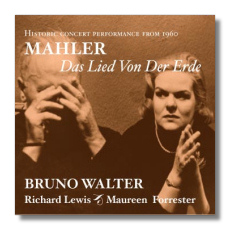
The Internet's Premier Classical Music Source
Related Links
- Mahler Reviews
- Latest Reviews
- More Reviews
-
By Composer
-
Collections
DVD & Blu-ray
Books
Concert Reviews
Articles/Interviews
Software
Audio
Search Amazon
Recommended Links
Site News
 CD Review
CD Review
Gustav Mahler

Das Lied von der Erde
Maureen Forrester, alto
Richard Lewis, tenor
"Philharmonic-Symphony Orchestra"/Bruno Walter
Music & Arts CD-4206 AAD mono 64:40
This is a live recording from Carnegie Hall dating from April 16, 1960. Bruno Walter was closely associated with Mahler's music, of course, and he made no less than three studio recordings of Das Lied von der Erde – in 1936, 1952, and finally in 1960. Forrester and Lewis also made a commercial recording of this work, but not with Walter. On that occasion – November 1959, to be exact – the conductor was Fritz Reiner and the orchestra was the Chicago Symphony. That studio recording, released by RCA Victor, is at a lower voltage than the concert recording reviewed here. This is the last time that Walter would conduct Das Lied von der Erde.
Walter's first performance of this work was in 1911. (In fact, he premièred the score.) Living with a score for 49 years obviously gives a conductor a authority! It is less important to argue whether one of Walter's performances of Das Lied von der Erde is better than another than to welcome this on its own terms. Walter's reputation for being a mellow conductor late in life is not entirely justified by this performance, which is a passionate one, although never crossing over into bathos or self-indulgence. (Live concerts are different animals than studio recordings, after all.) There is at least one passage in this performance which moves me more than in any other, live or studio, and that is the orchestral lead-up to "Die liebe Erde" in the final movement. Walter builds a feeling of enormous anticipation here, and when Forrester's voice enters, one reaches either catharsis or orgasm, depending on one's preference! The orchestra's woodwinds also distinguish themselves in this performance with characterful solo work.
His German is sometimes less than idiomatic ("ay-vig" for "ewig," "Vo-gull" for "Vogel," etc.) and he spectacularly blows his entrance in the fifth movement by coming in too early. Nevertheless, tenor Richard Lewis does a fine job with his three difficult solos. A Heldentenor -type voice often is used in this work, and when one remembers that Lewis sang (among many other things, of course) Nanki-Poo in the Glyndebourne Festival's recording of Gilbert and Sullivan's The Mikado, one fears for both his voice and his sanity here. True, he yells a bit in the first movement, but elsewhere his handsomely metallic voice cuts through Mahler's scoring without forcing, and he makes the requisite interpretive points. Many a tenor has done much worse.
Perhaps because she made relatively few appearances on the operatic stage, Maureen Forrester is not spoken of today as much as she deserves to be. Her singing was always intelligent and stylistically aware. (For some wonderful examples of her way with Handel, I recommend a compilation from CBC Records.) Walter was fortunate to record this work in the studio with Kathleen Ferrier (1952) and Kerstin Thorborg (1936), but Forrester isn't at all in the shade of those two fine ladies. Forrester's voice was penetrating, and its warmth was womanly, and not really maternal. (Certainly not "butch"!) This performance shows off those qualities, as well as her excellent diction and her telling way with the text. She knows her way around the difficult final movement and is very moving, if not as personal as Ferrier.
The audience makes its presence known throughout, and there are occasional bumps, ticks, and other sonic artifacts, but the sound is not bad at all. This CD doesn't replace any of Walter's studio recordings, but it is a worthwhile complement to them, and is very recommendable on those grounds.
Copyright © 2005, Raymond Tuttle




















